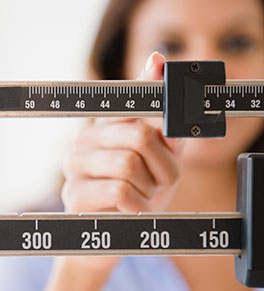Beating the quarantine 15

A meme making the rounds of a Facebook group practicing social-distancing reads: “I’m not sure how many cookies it takes to be happy, but so far it isn’t 27.”
Welcome to the “quarantine 15,” what some people have dubbed the weight gain likely to result from weeks of stress and self-isolation due to the novel coronavirus. It's akin to the 15 pounds college freshman are said to pack on during their first semester away from home.
The temptation to overeat can be difficult to conquer when people are spending most of their time in the house to avoid catching or spreading COVID-19. There’s no prescribed lunch break, as there might be in an office, or a breakfast to be grabbed before the commute.
Instead, we’re ever-adjacent to the pantry and refrigerator. Often, we’re fighting boredom or stress or both, feelings that often lead to eating when we’re not hungry.
Meeting the challenge
Katie Rankell understands the challenges 300 times over. As director of the UCI Health Weight Management Program, she oversees the weight-loss progress of 150 patients and the weight maintenance of 150 more.
Usually, clients come into the program’s offices to be weighed each week, pick up meal replacements and attend a class to help them in their efforts.
The COVID-19 crisis has changed all that: Meal replacements are now shipped to patients’ homes. They self-report their weight each week and they log into online classes, where a popular topic is how to stay on track while hunkering down.
Rankell offers the following tips for managing your weight during this difficult time.
Create a routine
Regular mealtimes are as important as maintaining regular sleep and work schedules while we’re all housebound by COVID-19.
“People are struggling with the lack of structure,” says Rankell, who recommends:
- Setting specific times of day for breakfast, lunch and dinner
- Scheduling three snacks throughout the day
- Avoiding off-schedule eating
Rankell says these set periods for meals and snacks can help your brain realize that other times aren’t for grazing in the kitchen.
They also keep you from getting so hungry that you overeat at any point.
Recognize your feelings
Ask yourself, ‘Am I truly hungry?’ Or are you heading to the refrigerator out of boredom or stress?
Eating won’t to solve those problems, Rankell notes. It will only create other ones. If you’ve eaten recently, chances are that it isn’t hunger making you uncomfortable or restless.
Rankell suggests doing something positive, such as:
- Calling a friend
- Reading a book interesting article
- Switching up work tasks if boredom strikes
Meditation and exercise breaks are also great strategies for reducing stress – and stress eating.
Are you thirsty?
Thirst is another sensation that can make people think they’re hungry when they’re not.
“We often can’t tell the difference between hunger and thirst,” Rankell says. That’s why many diet programs suggest drinking a glass of water first if you think you’re hungry.
If you need reminders, set timers for yourself. There also are apps such as Waterlogged that can prompt you to hydrate and keep track of your fluid intake, Rankell says.
Make good shopping choices
For those times you do head to supermarkets – being careful to keep a safe six-foot distance from others, wear a mask and sanitize your hands – or when ordering food deliveries, use a grocery list.
You might have to make some substitutions if there are shortages, but make sure you choose healthy alternative. Include plenty of fresh fruits and vegetables, which are nutritious and essential to good health.
One good thing about staying mostly at home is that if you don’t have junk food there, you can’t eat it.
Eat mindfully
Measure your food portions and track how much you are eating.
“Ask yourself, ‘Is that a third of a cup of cereal you have or a cup and a half?” Rankell says.
Many people have trouble estimating how large their portions of food are, so use measuring spoons and cups, and a food scale if you have one.
In addition, keep a record of everything you eat. It can be on paper or in a food diary, but there are also helpful tracking apps and free websites you can use that also provide good estimates of your calorie intake.
When people are grazing all day, they tend to underestimate just how much they’ve eaten.
Set aside time for exercise
Outdoor walks are still recommended as safe and healthy, as long as you maintain that six-foot distance from others.
Regular exercise not only alleviates boredom and stress, it also is a major component of weight maintenance, Rankell says.
Do you prefer a different kind of activity, or want to stay indoors? Most gyms and many other organizations are now offering online exercise classes, everything from yoga to cardio, Rankell says.
YouTube has a wide selection exercise videos for all ages and activity preferences.
With habits and tools like these, sheltering in place may even be the time you can work on shedding some unwanted pounds.
Related stories
Explore further
Browse more blog posts by topic.




